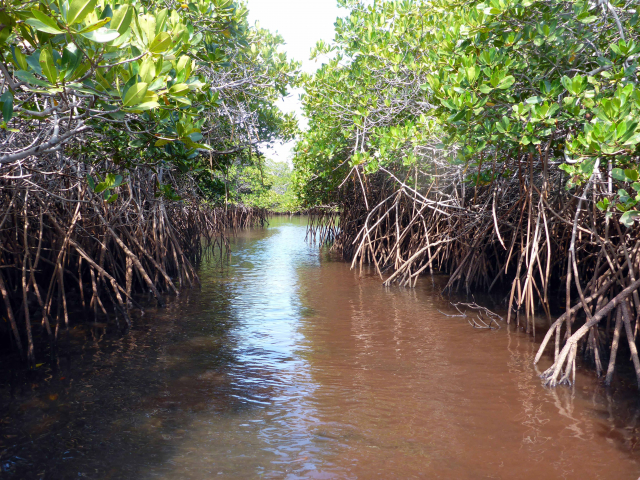26/07/2022 | July 26 is World Mangrove Day. On this day, numerous organizations around the world remind us of our responsibility as consumers and decision-makers to contribute to the long-term conservation of these very special ecosystems.
Mangroves grow on sandy to muddy substrates in the upper intertidal zone of tropical coasts. There, they contribute locally and regionally to coastal protection and to the standard of living and income of the population. But they are also of great importance to people in Europe, as they not only contribute seafood for regional fisheries and export to Europe, but also remove large amounts of carbon dioxide from the atmosphere, store it long-term in their wood, and prevent the release of carbon dioxide from degradation processes for centuries by storing organic material from land and sea in their oxygen-free sediments.
According to current knowledge, this so-called "blue carbon" helps mitigate climate change. Through the many other ecosystem services they provide, mangrove forests are also seen as a promising nature-based solution for adaptation to climate change impacts.
Although annual rates of loss of mangrove areas have dropped dramatically in recent years, we have lost about half of all mangrove areas worldwide to human impacts since the beginning of industrialization. The protection, sustainable use and reforestation of mangrove forests far beyond the tropical belt are therefore the order of the day. One of the main causes of mangrove deforestation in many regions of the world is the production of seafood in land-based aquaculture - whose products also fill the refrigerated shelves of German supermarkets.
The Second Mangrove Future Day, 09-10 June 2022, at the Representation of the State of Bremen in Berlin, was organized by the Leibniz Centre for Tropical Marine Research (ZMT), the Global Nature Fund (GNF), the German Environmental Aid (DUH) and the startup fairGROVE, and supported by the Senator for Science and Ports of the State of Bremen. The event addressed opportunities for sustainable use of and value creation from mangrove forests through blue economy approaches, concepts for their protection and reforestation, as well as their potential for climate change mitigation and CO2 compensation. In particular, mangrove-friendly and sustainable aquaculture combined with reforestation measures seem to have great socio-economic potential and wide acceptance. Further solutions and concepts are currently being developed and discussed in many places.
One of the most urgent tasks of science and politics now is to raise awareness and understanding of the immense ecological, socio-economic and climatic importance, but also the still great threat to mangrove forests -as well as other vegetation-rich coastal ecosystems, such as salt marshes, seagrass beds or kelp forests- among the population. Science and politics must work actively and intensively for the protection and sustainability of the use of these important, but also sensitive, ecosystems - in Germany, Europe and worldwide.





